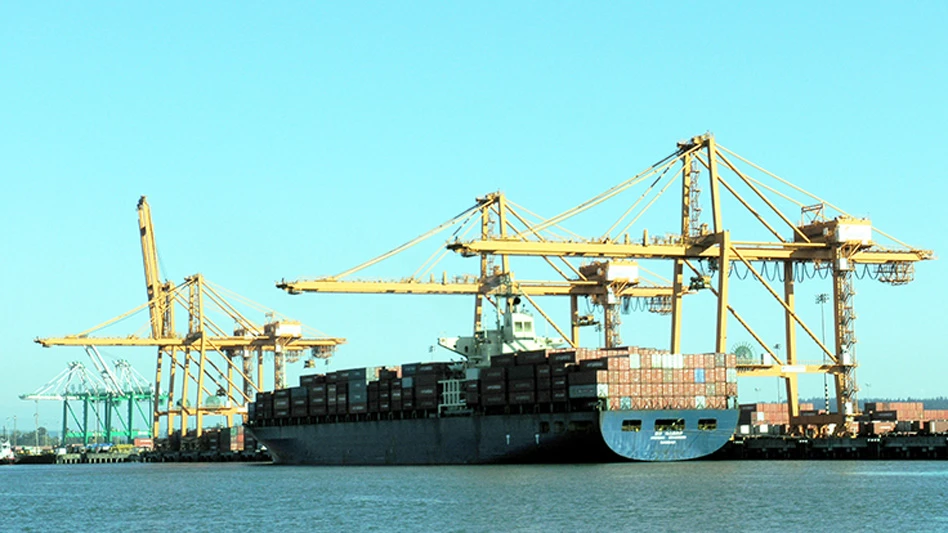 Editor’s Note: On Oct. 31, 2011, the U.S. District Court for the Southern District of New York entered an order granting the application of the Securities Investor Protection Corp. (SIPC) finding that the customers of MF Global Inc., New York, were in need of the protection afforded by the Securities Investor Protection Act (SIPA). James Giddens was appointed trustee for the liquidation of MF Global Inc. and Hughes Hubbard & Reed LLP was appointed as counsel to the trustee.
Editor’s Note: On Oct. 31, 2011, the U.S. District Court for the Southern District of New York entered an order granting the application of the Securities Investor Protection Corp. (SIPC) finding that the customers of MF Global Inc., New York, were in need of the protection afforded by the Securities Investor Protection Act (SIPA). James Giddens was appointed trustee for the liquidation of MF Global Inc. and Hughes Hubbard & Reed LLP was appointed as counsel to the trustee.
When the problems with MF Global first arose, Dan Sandoval, senior editor of Recycling Today, interviewed several members of the Cleveland, Ohio-based law firm of Thompson Hine to discuss the events surrounding the MF Global bankruptcy, what it means for companies involved in hedging metals pricing and what to look for going forward. He spoke with three attorneys:
Mark A. Weintraub, a business restructuring and creditors’ rights attorney, has been with Thompson Hine since 2004. Prior to starting his legal career, he was in the scrap recycling industry for 20 years. Weintraub was asked by the Insitute of Scrap Recycling Industries Inc. (ISRI) to develop a webinar on the MF Global bankruptcy and its impact on the metals recycling industry. He will moderate a panel at ISRI’s 2012 Annual Convention titled “Hedging in a Post-MF Global World.” Weintraub also represents two metals industry clients in connection with the MF Global bankruptcy.
Andrew L. Turscak Jr. is a partner at Thompson Hine specializing in business restructuring and creditors’ rights based at the firm’s Cleveland office. Turscak previously served as counsel to a Securities Investor Protection Act (SIPA) trustee in a liquidation proceeding under SIPA.
Terry Davis is senior counsel with Thompson Hine in the firm’s Atlanta and Washington, D.C., offices. His practice serves clients in the financial services industry. Prior to joining Thompson Hine, Davis served as a chief compliance officer and as the enterprise compliance officer for ING U.S. Financial Services.
Recycling Today (RT): Can you explain what transpired prior to the MF Global bankruptcy? How was the company used by commodities traders?
 Terry Davis (TD): MF Global was essentially a broker-dealer in the commodity space. It effectively served as conduit between a trader who wanted to trade futures or commodities but who didn’t have direct access to the exchange.
Terry Davis (TD): MF Global was essentially a broker-dealer in the commodity space. It effectively served as conduit between a trader who wanted to trade futures or commodities but who didn’t have direct access to the exchange.
As we understand it, MF Global placed very large bets on European sovereign debt. As a consequence of the problems with the European Union from a budget and fiscal perspective, those investments declined in value, forcing MF Global to meet margin calls, which the company had difficulty meeting. It also appeared there were circumstances where MF Global began dipping into clients’ accounts to meet margin calls. When that came to light, the regulators stepped in and MF was forced to seek bankruptcy protection.
Mark Weintraub (MW): MF Global, which was over 200 years old, had multiple tiers of hedging programs that it provided to its commodity customers. MF Global also provided sophisticated analyses of markets worldwide.
RT: What caused the company to file for bankruptcy protection?
TD: When John Corzine (CEO of MF Global at the time of its collapse) first came in, his goal was to transform what had been a well-respected commodities business into a Wall Street-type investing firm. Over the past several years Corzine had been reinventing the culture of MF Global.
While he was trying to change the culture of the company, it would appear that he didn’t spend enough time focusing on the compliance and control aspect. As he tried to transform the business, he began to focus on the top-line revenue number. From what we understand, the focus on revenue increasingly began to drive decisions within the business that explains, at least in part, the aggressive move into sovereign debt.
At the end of the day, MF was in a trust business and it betrayed the trust of its customers.
 MW: These customer accounts that we are talking about are not insured by the government or guaranteed. The money put up as margin for the trading is really collateral against trading activity. But it is still customer money. The law is very clear on the segregation of that money from MF Global’s house account.
MW: These customer accounts that we are talking about are not insured by the government or guaranteed. The money put up as margin for the trading is really collateral against trading activity. But it is still customer money. The law is very clear on the segregation of that money from MF Global’s house account.
When people are engaging in a risk mitigation act they are not putting these funds at risk. They are not investing and they are not buying securities. The funds or assets are collateral. One of the critical issues is that money is missing.
Under the law, there is a very distinct set of rules to follow to return customer money in the case of bankruptcy. What has turned things on their ears is that these funds appear to have been misused. Whether laws have been broken remains to be seen.
There was the requirement that these account funds be kept separate and not be used for any other purpose. Compliance with those requirements was the only type of assurance.
As we saw in the MF Global case, those funds were used for other purposes, whether in violation of any federal law, regulators and prosecutors will make that determination.
Once the losses occurred, there was no backstop or safety net, such as FDIC (Federal Deposit Insurance Corp.) protection, SIPC (Securities Investor Protection Corp.) protection or FSLIC (Federal Savings and Loan Insurance Corp.) protection.
TD: There also are assertions that MF Global engaged in off-balance-sheet transactions, which made it harder to trace money and to determine who it belonged to. Off-balance-sheet transactions tend to represent a greater degree of risk.
 Andrew Turscak Jr. (AT): As for the actual bankruptcy, events happened quickly and furiously during the several days leading to the bankruptcy on Halloween (Oct. 31, 2011).
Andrew Turscak Jr. (AT): As for the actual bankruptcy, events happened quickly and furiously during the several days leading to the bankruptcy on Halloween (Oct. 31, 2011).
On Oct. 26, Chicago Mercantile Exchange (CME) auditors visited MF Global and reviewed its financial statements and daily segregation reports, which detailed segregation of account funds. They showed compliance. On Oct. 30, the auditors had to make an emergency trip to MF Global. They were notified by Commodity Futures Trading Commission personnel who were on site that the segregation report in draft form that was supposed to be submitted the following day was going to show a significant shortfall in funds segregated under the Commodity Exchange Act.
On Oct. 31, CME auditors determined the segregation report was going to show a shortfall of about $600 million. The bankruptcy filing was immediately commenced.
RT: Since then, what steps have government regulators taken to prevent another MF Global Situation?
TD: One change is that the Commodity Futures Trading Commission (CFTC) proposed amendments that cover the manner in which a firm like MF Global can use customer funds held on account. Companies are supposed to invest those funds in safe instruments like money market funds.
What MF Global was alleged to have done is engage in more risky transactions with customer funds, including investing in the sovereign debt we discussed earlier. Use of more aggressive investments and transactions, including repurchase agreements, exposed customers’ funds to undue risk in the view of the CFTC.
Going forward, it is difficult to predict what will come out of MF Global investigation and all the proceedings associated with it. It is likely that we will see increased emphasis on safeguarding clients’ funds and strengthening the capital positions of trading firms. You will see additional limitations on that activity with futures traders like MF Global.
(Editors’ note: Since this interview, the CFTC has adopted more stringent rules governing the permitted investing of customer money. One provision prohibits investing in sovereign debt.)
RT: What impact will MF Global’s collapse have on the hedging business?
MW: In my view, within the scrap metal industry, hedging has really grown in the last 10 years. It had always seemed too sophisticated. But over the course of the last 10 years, it became more commonplace in the recycling business. Access to hedging for smaller “mom and pop” businesses grew, and more companies became engaged in hedging as risk mitigation against the fluctuations in metals pricing.
To some degree, people will now be wary of using hedging as a risk mitigation tool. Also, there is the possibility that transaction costs may increase due to greater oversight and reporting requirements, as well as restricting the hedging firms’ ability to [earn income] on the money. Historically, commodity brokerages were permitted to invest some level of the commodity customer funds; in other words, the brokerages were making money on customer collateral. The theory was that it would help underwrite costs and make more capital available. That could raise the cost of doing business, which will be passed on to customers.
|
Key Terms CME – The Chicago Mercantile Exchange provides benchmark futures and options products designed to serve the risk management needs of customers. SIPC – The Securities Investor Protection Corp. steps in when a brokerage firm is closed because of bankruptcy or other financial difficulties and customer assets are missing. The SIPC works within certain limits to return customers’ cash, stock and other securities and other customer property. SIPA – The Securities Investor Protection Act is a law that established the Securities Investor Protection Corp., which acts to insure investors for up to $500,000 when the brokerage firm is a member. It includes up to $100,000 of insurance for cash accounts. CFTC – The Commodity Futures Trading Commission was created as an independent agency with the mandate to regulate commodity futures and option markets in the United States. The agency’s mandate has been renewed and expanded several times since its creation, most recently by the Dodd-Frank Wall Street Reform and Consumer Protection Act. SEC – The U.S. Securities and Exchange Commission oversees the securities world, including securities exchanges, securities brokers and dealers, investment advisors and mutual funds. The SEC seeks to promote the disclosure of important market-related information, to maintain fair dealing and to protect against fraud. FDIC – The Federal Deposit Insurance Corporation (FDIC) is a U.S. government firm that provides deposit insurance of up to $250,000 for member banks. Margin Call – A margin call occurs when an account value depresses to a value calculated by a particular formula. The account holder must then add cash or other assets to the account to meet the margin call. |
Commodity brokers will have to figure out how to retain that business and provide customers with a greater level of assurance that brokerage houses are not putting commodity customer’s funds at greater risk and that the system is safe.
RT: What type of due diligence should prospective clients take before committing to a company? Is it recommended that they spread their money to multiple firms?
Sponsored Content
Labor that Works
With 25 years of experience, Leadpoint delivers cost-effective workforce solutions tailored to your needs. We handle the recruiting, hiring, training, and onboarding to deliver stable, productive, and safety-focused teams. Our commitment to safety and quality ensures peace of mind with a reliable workforce that helps you achieve your goals.
TD: Before you establish a relationship, you need to do the due diligence on the firm itself, particularly the person with whom you have the relationship with at the firm. In that respect, check the available databases, including the SEC. Ask the firm how it handles client margin accounts. You need to be comfortable that the firm has the appropriate safeguards in place. You also should make sure there is no adverse regulatory information out there.
On an ongoing basis, you have to be mindful on what is going on—pay attention to media reports regarding your business partners; set Google alerts. Given today’s technology, there are many ways to stay informed in nearly real time on developments impacting your business partners. In the case of MF Global, the financial press had been reporting about financial issues for several months prior to the collapse of the firm.
RT: What steps can recyclers take to protect themselves? Is insurance available from a third party to guarantee their accounts?
MW: It is certainly something worth exploring with your carrier. A lot of that will come down to the defined occurrences within your insurance policy and the appetite of the insurance company to take on that risk. The risk of loss in many ways is no different from someone walking in your door and holding you up or breaking in at night and stealing from your office. I think people should look at their current policies and speak to their carriers and ask the questions.
Also, accounts for trading on domestic exchanges are being treated differently than portions of the account that were traded on foreign exchanges. If you are trading aluminum on the LME (London Metal Exchange) and copper on the COMEX (New York Mercantile Exchange and Commodity Exchange), you are being treated differently because the insolvency overseas is governed by laws overseas as opposed to here.
One notion may be to spread the risk by keeping domestic and foreign exchange accounts separate.
Make sure to not have any more cash or other assets in the account than necessary. Pull that cash out as frequently as possible and wire it to another account.
RT: In the case of MF Global, how much of the individual customers’ money has been returned?
MW: In theory, with the third distribution, 72 percent of the value of the domestic portion of the account should have been returned. Open contracts will be transferred to other brokers, like R.J. O’Brien or others. The trustee is still holding funds in reserve and doesn’t know yet how much is missing; it is between $600 million and $1.2 billion. There were tens of thousands of transactions, and they are going to have to trace those transactions.
We are advising people to get their claims in and provide as much account information as they can, even copies of their most recent statements.
(Editors’ note: Since the time of this interview, the trustee has made an application to the court for a further distribution equaling approximately one-half of the amounts held in reserve, which is equal to about an additional 10 cents on the dollar, raising the total distributed to date to 82 cents on the dollar.)
RT: For the future, what are the best and worst scenarios?
MW: Certainly for individual account holders the best-case scenario will be a full recovery of what they had and receiving the level of assurance they need to continue their hedging program so they can conduct business without a sense of greater risk because of this case.
If you are engaged in a risk mitigation practice and you are hedging and you didn’t do business with MF Global, the worst-case scenario is saying to yourself, “It didn’t affect my account.” That is burying your head in the sand. I think that this issue should raise awareness of these issues to all commodity customers, not just MF Global’s former customers.
This company was over 200 years old. It was a preeminent firm, not unlike Lehman Brothers, which also collapsed.
You need to be aware. That may not be the answer you are looking for, but you need to derive as much education out of this as possible and engage in diligence with your business partners.
Dan Sandoval is senior and Internet editor with Recycling Today. He can be contacted via email at dsandoval@gie.net.
Get curated news on YOUR industry.
Enter your email to receive our newsletters.

Explore the April 2012 Issue
Check out more from this issue and find your next story to read.
Latest from Recycling Today
- Nucor expects slimmer profits in early 2025
- CP Group announces new senior vice president
- APR publishes Design Guide in French
- AmSty recorded first sales of PolyRenew Styrene in 2024
- PRE says EU’s plastic recycling industry at a breaking point
- Call2Recycle Canada, Staples Professional expand partnership
- Circular Services breaks ground on north Texas MRF
- Tariff uncertainty results in choppy nonferrous scrap flows







